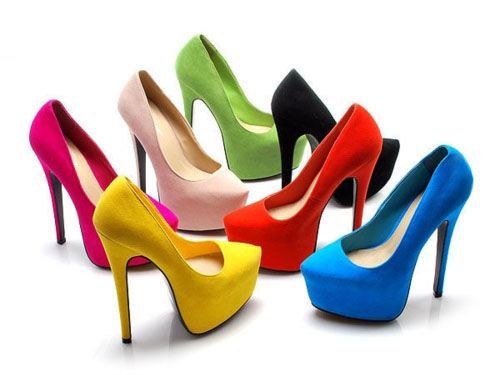No-pain high heels guide
It takes one hour, six minutes and 48 seconds for our high heels to start hurting, according to a recent survey by the College of Podiatry in UK.
The survey involved 2,000 women and men and for a more delicate 20% of respondents, the pain starts after just ten minutes, while more than a third said their feet had been so sore on a night out that they danced shoeless and walked home barefoot.
So what can we do to lessen the pain?
1. Never buy online
“First things first, shoes have to fit properly,” says podiatrist Emma Supple.
“If they’re tight or rubbing, even just a tiny bit, don’t buy them. You will not break in the shoes – they will break you. This is why you should never buy them online, as you’ve got to try them on.”
The right fit should be snug but with some room for your toes to wriggle and not be squashed. Too small and you’ll get blisters and deformed toes – a condition called hammer toe.
Too big and your feet will slide down and put more pressure on your toes. Where possible, ask to try a half size up or down to see if that helps.
If the shoe is pointed, the point must come after your toes end so they’re not squished together.
According to Emma Supple, it’s better to avoid them altogether.
“A slightly rounded toe is always going to be more comfortable,” she says.
2. Are your heels in the right position?
Contrary to popular belief, wedges are not necessarily better for your feet than spiked heels.
“I’ve seen a woman doubled over with pain after wearing wedges,” says Emma Supple.
“There’s very little flexibility in them and you have to lift your feet right off the ground to walk, stomping your foot back down afterwards.
“The important thing is not the style or thickness of the heel, it’s the position of it. It needs to be right under the heel bone, not at the back of the foot, as is the case with some shoes. If the stiletto is positioned too far back, you are going to be thrown off balance and everything will hurt.”
3. Why budget buys may cost you dear
Avoid the temptation to buy cheap heels for a night out. Chances are they will be made of plastic, which will make your feet sweat and swell – making the shoes pinch.
Also, plastic has very little give, meaning you are more likely to get blisters where it rubs. Shoes with a leather lining, on the other hand, are softer and suppler and less likely to rub.
4. How to stop them rubbing
If your shoes are stiff and rubbing at the heel, try a suede heel grip.
Hikers – who have to deal with blisters every day – swear by Moleskin Plus by Dr Scholl’s, which comes in a roll. It’s very soft and you cut as much as you need and stick it to different areas of the foot.
Pedag’s anti-slip slingback stickers are also brilliant. You stick the soft leather strip into your slingback straps and it stops them from falling down and prevents friction.
5. Non-surgical solutions
Die-hard heel lovers are now having fillers injected into the balls of their feet to help with the pain, but there are less drastic alternatives. Soft gel-filled cushions can relieve the pressure put on the balls of your feet, especially if your shoes have thin soles.
Dr Scholl’s “party feet” gel cushions are still the most popular but M&S do a good range, too.
“Be careful of ones that are so thick they squish your feet more than they already are,” says Emma Supple.
6. Put your feet in ice
“Forget soaking your feet in a hot bath after a long day – you need to ease the pain with cold,” says Emma Supple.
“After wearing high heels your feet get swollen, so when you come home put them in a cold bath for 15 minutes to reduce the swelling. Then before you go to bed apply some foot cream. This restores the suppleness of the skin, which will help prevent it from cracking and blistering.”
Try Supple London Mineral Foot cream or Eucerin Dry Skin Intensive Foot Cream. Keep your toenails short so they don’t dig into your skin when your toes are in narrow shoes.
7. Which brands are best?
Not all heels are equal but many high-street brands are now designing heels with comfort in mind.
From autumn, all M&S’s shoes will have padded “Insolia” soles, which promise to re-distribute the weight away from the balls of your feet and are meant to be three times more comfortable than normal heels. They already have a selection in the Autograph range.
Clarks have really upped their game recently and combined comfort and style, even more so with the Mary Portas collections and their “soft wear” styles.
Geox used to be known for their practical styles made of breathable materials and thick shock absorbing soles, but they’ve started to make more glamorous styles, teaming up with designer Patrick Cox.
Spanish shoemaker Chie Mihara studied orthopedics, which means her collection of high heels are the most comfortable around. Most come with thick, adjustable ankle straps to support the foot.
Even Lucy Choi, the niece of Jimmy Choo and the latest darling of the shoe world, has just launched a gorgeous but practical collection of mid-height heels with gel-padded soles.
[youtube o5V2l1H2sGA]

